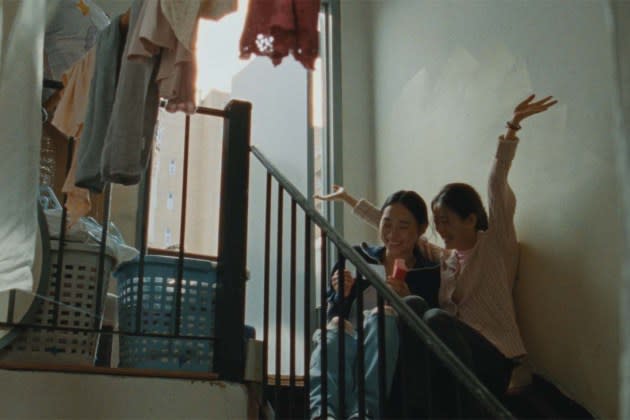Cannes Hidden Gem: ‘Blue Sun Palace’ Is a Bracing Look at the Chinese Immigrant Experience in NYC

The first feature from director-writer Constance Tsang, the Cannes Critics’ Week title Blue Sun Palace, is set in Flushing, Queens, where two migrants, Amy from Taiwan and Didi from China,work in a massage parlor and struggle to get by. But viewers could be forgiven for not recognizing the location.
There are no drone shots of the Queens skyline, no wide establishing shots of Flushing’s bustling Chinese community. Instead, Tsang frames her subjects tightly, placing them in liminal spaces like stairwells and hallways — “thresholds,” Tsang explains, where they’re “so close to freedom, but it’s never afforded to them.”
More from The Hollywood Reporter
Cannes: Byron Allen's Freestyle Acquires North American Rights to 'The Ghost Trap' (Exclusive)
Ontario Hoping for a Production Bounce Amid Hollywood Slowdown
Kino Lorber Expands Streaming Service Featuring Ken Loach, Yorgos Lanthimos, Jia Zhangke
Amy and Didi dream of a better life, but their world is in part constrained by the sometimes inward-looking construct of the Chinese immigrant community.
“When we talk about spaces in general, I feel like my decision not to do these establishing shots [and instead] to create this feeling of confinement has to do with the way that I think the Chinese community builds itself, especially when they move to America,” Tsang explains. “There’s a really kind of insular, tight-knit choice that they have.”
Discussing her movie, which is screening in the parallel film festival sidebar to the 2024 Cannes Film Festival that is organized by the French film critics’ union, Tsang, who lived with her parents in Flushing until her father died when she was 16, sees that dynamic in her own family. “A lot of their lives happen within this bubble,” she says. “The conversation of freedom and what it really means, I think that actually has to do with my own perception on the limitations of what these people can achieve here.”
Tsang’s tight framing also keeps the focus on the endless, invisible work done by Amy and Didi and immigrants like them. Their waking hours are defined by labor, both physical and emotional.
Tsang was not unfamiliar with such workers. After her father’s death, her mother began managing commercial properties; massage parlors were some of her tenants. Then, as Tsang was writing the script between 2018 and 2022, real-time tragedies also began to inform the story.
“COVID was just happening, the Atlanta spa shootings, the rise of Asian hate crimes,” she recalls. “It all felt like something that was happening around me.”
The media coverage of Asian massage parlor workers touched Tsang. “In doing the research and really trying to get a grasp on this specific setting for the story, I was really drawn to these particular women because they reminded me of my mother,” she says. “They reminded me so much of the labor that was involved and how much that was overlooked at times.”
Tsang also worked with anti-human trafficking consultants He Manqing and Susan Chung, who told her heartbreaking stories of trafficked women, many of whom didn’t speak English. Some “had been trafficked and didn’t even realize that they were being trafficked,” Tsang recalls, or shared one cellphone “that they couldn’t really even use because they didn’t know who to call.”
But beyond the painful struggles of women like Amy and Didi, Tsang hopes audiences will recognize their humanity, and that “there is a life behind these people, there is family that they have that live far away,” she says, “that there is loneliness, and also beauty and joy and complexity.”
Best of The Hollywood Reporter
